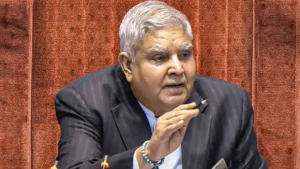GS2 – Society

Context:
At the 4th Convocation Ceremony of IIIT-Kota, Vice-President Shri Jagdeep Dhankhar critically examined India’s education and digital dependency landscape, urging reforms to uphold technological nationalism and educational ethics.
Key Concerns Raised:
- Coaching Centres as “Poaching Centres”:
- Described as talent black holes, promoting rote learning and commercialised education.
- Focus on grades over curiosity harms student well-being and creativity.
- Criticised for being advertisement-driven and incompatible with NEP 2020’s goals of holistic, multidisciplinary learning.
- Cramming Culture:
- Present academic system creates “degrees without depth” and “intellectual zombies” through rote memorisation.
- Digital Dependence Threat:
- Emphasised that sovereignty risks today come not from wars but from reliance on foreign digital systems.
- Warned of algorithmic dominance and the paralysis of critical national functions during crises.
- Exclusion in Tech Solutions:
- Many tech platforms:
- Do not work in rural areas.
- Exclude regional languages.
- Ignore accessibility needs of the disabled.
Proposed Reforms:
- Skill Hubs:
Transform coaching centres into innovation and skill development hubs in line with NEP 2020. - Revival of Gurukul Spirit:
Promote value-based, community-driven learning inspired by India’s traditional education systems. - Technological Patriotism:
Encourage self-reliant tech solutions like homegrown AI, cloud computing, and cybersecurity tools. - Educational Ethics Mission:
Launch a “Curiosity First” campaign in schools and colleges to foster reason-based learning and reform assessments. - Local Digital Innovation:
Encourage Indian youth to lead in digital exports, become job creators, and drive educational transformation.




